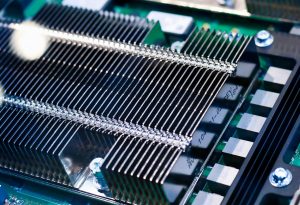 Companies have long turned to technology to optimize and streamline their core processes, and maintaining that technology has been an important process ever since. For many more advanced forms of technology, that includes implementing electrical cooling solutions that allow for constant and efficient cooling of the application’s electrical enclosures. As technology has advanced and become more powerful over the decades, heat exchangers have consistently proven a viable cooling solution. With an advanced level of thermal management capabilities and their simplified, natural methods of transferring waste heat, heat exchangers are an increasingly vital feature of modern advanced technologies. (more…)
Companies have long turned to technology to optimize and streamline their core processes, and maintaining that technology has been an important process ever since. For many more advanced forms of technology, that includes implementing electrical cooling solutions that allow for constant and efficient cooling of the application’s electrical enclosures. As technology has advanced and become more powerful over the decades, heat exchangers have consistently proven a viable cooling solution. With an advanced level of thermal management capabilities and their simplified, natural methods of transferring waste heat, heat exchangers are an increasingly vital feature of modern advanced technologies. (more…)
How Heat Exchangers Help Companies Lower Operating Costs
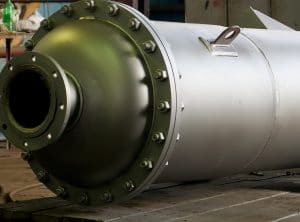 Heat exchangers have helped improve the quality of electrical thermal management in several different ways, and companies that utilize them can benefit significantly in many different areas. For example, compared to more conventional cooling solutions, heat exchangers are able to operate with substantially greater efficiency, and can help companies reduce their overall environmental footprints. Yet, one of the most significant advantages of the use of modern heat exchangers has been the ability for companies to dramatically lower their operating costs, from their overall energy expenditures to collective routine maintenance, and much more. (more…)
Heat exchangers have helped improve the quality of electrical thermal management in several different ways, and companies that utilize them can benefit significantly in many different areas. For example, compared to more conventional cooling solutions, heat exchangers are able to operate with substantially greater efficiency, and can help companies reduce their overall environmental footprints. Yet, one of the most significant advantages of the use of modern heat exchangers has been the ability for companies to dramatically lower their operating costs, from their overall energy expenditures to collective routine maintenance, and much more. (more…)
The Modernization of Electrical Thermal Management
 The realm of electrical thermal management hasn’t always followed the same trends of advancement as other forms of technology. For example, as many technological solutions have grown increasingly more complex, more advanced electrical cooling solutions have typically grown more streamlined. In doing so, they’ve also grown much more efficient and reliable, making modern thermal management a more cost and energy efficient process than it’s ever been. Rather than making electrical cooling more complicated in order to make it more advanced, modern electrical thermal management solutions enhance cooling processes by making them more natural and simplified. (more…)
The realm of electrical thermal management hasn’t always followed the same trends of advancement as other forms of technology. For example, as many technological solutions have grown increasingly more complex, more advanced electrical cooling solutions have typically grown more streamlined. In doing so, they’ve also grown much more efficient and reliable, making modern thermal management a more cost and energy efficient process than it’s ever been. Rather than making electrical cooling more complicated in order to make it more advanced, modern electrical thermal management solutions enhance cooling processes by making them more natural and simplified. (more…)
The Difference in Electrical Cooling with Heat Exchangers
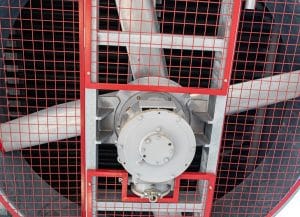 In many different industries, one of the keys to technological advancement has been the streamlining of thermal management techniques and companies’ electrical cooling capabilities. As technology has grown more powerful, the need to efficiently manage the waste heat that it produces has also become important. Meeting that need within the increasingly tighter confines of newer technologies, while minimizing the overall costs of keeping the application properly cooled, can be more than challenging for older cooling solutions. The difference in electrical cooling with modern heat exchangers, which don’t rely on the same cumbersome thermal management processes, has proven an important catalyst for technology to continue advancing further. (more…)
In many different industries, one of the keys to technological advancement has been the streamlining of thermal management techniques and companies’ electrical cooling capabilities. As technology has grown more powerful, the need to efficiently manage the waste heat that it produces has also become important. Meeting that need within the increasingly tighter confines of newer technologies, while minimizing the overall costs of keeping the application properly cooled, can be more than challenging for older cooling solutions. The difference in electrical cooling with modern heat exchangers, which don’t rely on the same cumbersome thermal management processes, has proven an important catalyst for technology to continue advancing further. (more…)
An Eco-Friendly Approach to Electrical Thermal Management
 When companies seek to enhance their operations by investing in newer and more advanced technologies, the ultimate goal is typically to improve their overall productivity. Ideally, the new technology will also help reduce the costs of operations over time by beefing up the efficiency of existing systems. When it comes to electrical thermal management systems, the trends of advancement have often led companies to invest in more streamlined heat exchanger units, rather than more powerful air conditioners or air compressors. In addition to boosting productivity and efficiency, more advanced thermal management systems can also help companies enjoy a more eco-friendly approach to electrical cooling. (more…)
When companies seek to enhance their operations by investing in newer and more advanced technologies, the ultimate goal is typically to improve their overall productivity. Ideally, the new technology will also help reduce the costs of operations over time by beefing up the efficiency of existing systems. When it comes to electrical thermal management systems, the trends of advancement have often led companies to invest in more streamlined heat exchanger units, rather than more powerful air conditioners or air compressors. In addition to boosting productivity and efficiency, more advanced thermal management systems can also help companies enjoy a more eco-friendly approach to electrical cooling. (more…)
How Thermal Pins Use Heat Transfer Principles to Cool Molds
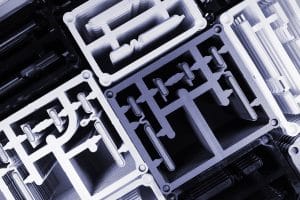 Effective thermal management is a significant aspect of any company’s operations. In most industries, the innovation of advanced technologies and their large-scale implementation in different industry settings has made it an even more significant consideration. Such technologies require consistent electrical thermal management solutions to prevent them from overheating due to excessive electrical waste heat. However, in manufacturing industries that revolve around plastic mold production, the impact of thermal management goes beyond the cooling of advanced electrical applications. It also directly influences the speed and quality of a company’s plastic mold yields, as well as a significant portion of the company’s overhead costs. (more…)
Effective thermal management is a significant aspect of any company’s operations. In most industries, the innovation of advanced technologies and their large-scale implementation in different industry settings has made it an even more significant consideration. Such technologies require consistent electrical thermal management solutions to prevent them from overheating due to excessive electrical waste heat. However, in manufacturing industries that revolve around plastic mold production, the impact of thermal management goes beyond the cooling of advanced electrical applications. It also directly influences the speed and quality of a company’s plastic mold yields, as well as a significant portion of the company’s overhead costs. (more…)
Phase-Change Cooling for More Streamlined Thermal Management
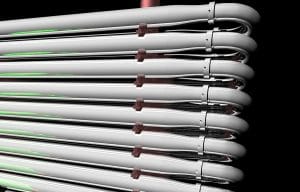 When it comes to modern electrical cooling, companies have a wider range of options than they used to. Not only can they choose cooling options than are more efficient and effective than traditional air conditioners, but they can also choose between cooling units that operate using different processes of naturally transferring waste heat. In many modern cooling solutions, that process involves the streamlined use of phase-change cooling, which utilizes and eco-friendly cooling’s natural properties to make absorbing and transferring waste substantially more efficient. (more…)
When it comes to modern electrical cooling, companies have a wider range of options than they used to. Not only can they choose cooling options than are more efficient and effective than traditional air conditioners, but they can also choose between cooling units that operate using different processes of naturally transferring waste heat. In many modern cooling solutions, that process involves the streamlined use of phase-change cooling, which utilizes and eco-friendly cooling’s natural properties to make absorbing and transferring waste substantially more efficient. (more…)
How Electrical Cabinet Cooling Became Eco-Friendly
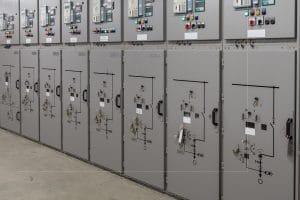 Electrical thermal management plays increasingly more and different roles in the daily operations of most companies. However, one of the oldest and most frequent roles is the cooling of electrical cabinets, control panels, and other enclosures that are essential to a company’s technology and operations. The cooling of electrical enclosures is so vital that the efficiency and quality of a company’s cooling solutions can largely impact its overall efficiency and level of production. Today, more companies utilize streamlined solutions such as heat exchangers that involve the rapid transfer of electrical waste heat, helping them enjoy more efficient and eco-friendly electrical cabinet cooling than traditional solutions have been able to provide. (more…)
Electrical thermal management plays increasingly more and different roles in the daily operations of most companies. However, one of the oldest and most frequent roles is the cooling of electrical cabinets, control panels, and other enclosures that are essential to a company’s technology and operations. The cooling of electrical enclosures is so vital that the efficiency and quality of a company’s cooling solutions can largely impact its overall efficiency and level of production. Today, more companies utilize streamlined solutions such as heat exchangers that involve the rapid transfer of electrical waste heat, helping them enjoy more efficient and eco-friendly electrical cabinet cooling than traditional solutions have been able to provide. (more…)
Energy-Based Advantages of Streamlined Heat Exchangers
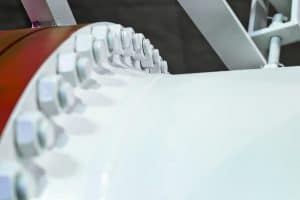 When companies utilize more advanced technological solutions, the goal is typically to enhance the efficiency and productivity of certain operations. However, electrical thermal management solutions impact nearly every operation to some degree, and more advanced electrical cooling systems have advantages that can reach beyond just a single application. In many cases, the reduced amounts of energy that advanced heat exchangers need to operate have led to significant benefits, including substantial cost savings and the improvement of eco-friendly business processes. (more…)
When companies utilize more advanced technological solutions, the goal is typically to enhance the efficiency and productivity of certain operations. However, electrical thermal management solutions impact nearly every operation to some degree, and more advanced electrical cooling systems have advantages that can reach beyond just a single application. In many cases, the reduced amounts of energy that advanced heat exchangers need to operate have led to significant benefits, including substantial cost savings and the improvement of eco-friendly business processes. (more…)
Reducing Costs with More Advanced Thermal Management
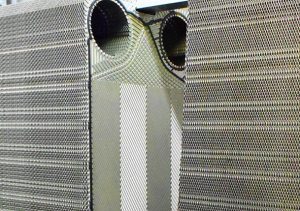 The ability to make electrical thermal management a cost-efficient process has been one of the most significant advantages of companies utilizing more streamlined cooling solutions. In many cases, those solutions involve modern heat exchangers that are designed to continuously transfer waste heat within electrical enclosures. With more advanced thermal management and the streamlining of electrical cooling processes, companies have significantly reduced many of the costs associated with older cooling solutions. (more…)
The ability to make electrical thermal management a cost-efficient process has been one of the most significant advantages of companies utilizing more streamlined cooling solutions. In many cases, those solutions involve modern heat exchangers that are designed to continuously transfer waste heat within electrical enclosures. With more advanced thermal management and the streamlining of electrical cooling processes, companies have significantly reduced many of the costs associated with older cooling solutions. (more…)







